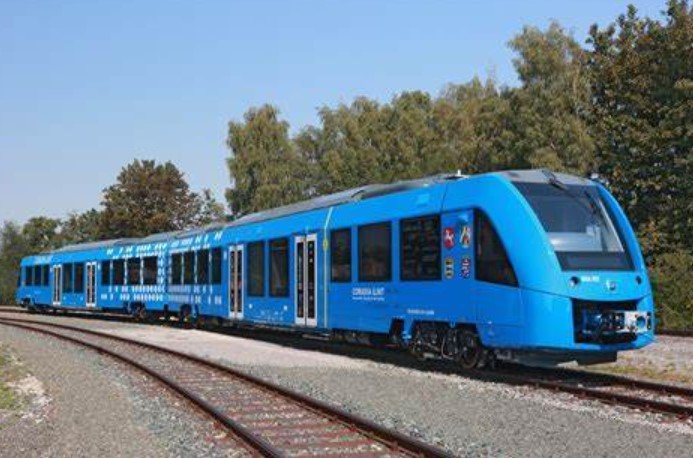India is set to join the league of countries that are developing hydrogen-powered trains, as the Indian Railways plans to launch its first such train by 2023. The project, which is part of the National Hydrogen Mission, aims to reduce carbon emissions and promote green energy in the transport sector.
What is a hydrogen train?
A hydrogen train, also known as a hydrail, is a train that uses hydrogen fuel cells to generate electricity for propulsion. Unlike conventional diesel or electric trains, a hydrogen train does not emit any harmful gases, but only water and heat. A hydrogen train consists of a hydrogen tank, a fuel cell, a battery, and an electric motor. The fuel cell converts hydrogen and oxygen into electricity, which is stored in the battery and used to power the motor. The excess electricity can also be fed back to the grid or used for other purposes.

How will India’s hydrogen train work?
The Indian Railways has partnered with the Indian Institute of Science (IISc) and RITES, a public sector consultancy firm, to develop the country’s first hydrogen train. The project will involve retrofitting an existing diesel-electric multiple unit (DEMU) train with a hydrogen fuel cell system. The train will have a capacity of 89 passengers and a speed of 75 kmph. The train will run on a 89-km route between Sonipat and Jind in Haryana, which is currently electrified. The hydrogen train will use the overhead electric wires to charge its battery and switch to the fuel cell mode when required. The train will also have a regenerative braking system, which will recover the kinetic energy during braking and store it in the battery.
What are the benefits of hydrogen trains?
Hydrogen trains offer several advantages over conventional trains, such as:
- Environmental benefits: Hydrogen trains do not emit any carbon dioxide, nitrogen oxide, or particulate matter, which are major contributors to air pollution and climate change. Hydrogen trains can also use renewable sources of hydrogen, such as solar, wind, or biomass, to further reduce the carbon footprint.
- Economic benefits: Hydrogen trains can reduce the dependence on imported fossil fuels and save on fuel costs. Hydrogen trains can also reduce the need for electrification of railway tracks, which is a costly and time-consuming process. Hydrogen trains can also create new jobs and industries in the hydrogen sector.
- Operational benefits: Hydrogen trains can run on both electrified and non-electrified routes, which increases their flexibility and efficiency. Hydrogen trains can also run longer distances without refueling, which reduces the downtime and maintenance costs.
What are the challenges of hydrogen trains?
Hydrogen trains also face some challenges, such as:
- Safety issues: Hydrogen is a highly flammable and explosive gas, which poses a risk of fire and explosion. Hydrogen trains need to have proper safety measures and standards to prevent and mitigate any accidents. Hydrogen trains also need to have adequate ventilation and cooling systems to prevent overheating of the fuel cell and the battery.
- Infrastructure issues: Hydrogen trains require a dedicated infrastructure for the production, storage, and distribution of hydrogen. Hydrogen trains also need to have special refueling stations and maintenance facilities. The development of such infrastructure requires a huge investment and coordination among various stakeholders.
- Technological issues: Hydrogen trains are still in the nascent stage of development and need to overcome some technical challenges, such as improving the efficiency and durability of the fuel cell, reducing the weight and size of the hydrogen tank and the battery, and enhancing the performance and reliability of the train.
What is the future of hydrogen trains?
Hydrogen trains have a promising future, as they can offer a sustainable and clean alternative to conventional trains. Hydrogen trains can also complement the existing modes of transport and contribute to the overall development of the country. Several countries, such as Germany, France, China, Japan, and South Korea, have already launched or tested hydrogen trains and are planning to expand their network. India, too, has a huge potential for hydrogen trains, as it has a vast railway network and abundant renewable energy resources. India’s first hydrogen train is expected to be a milestone in the country’s journey towards a hydrogen economy.



































